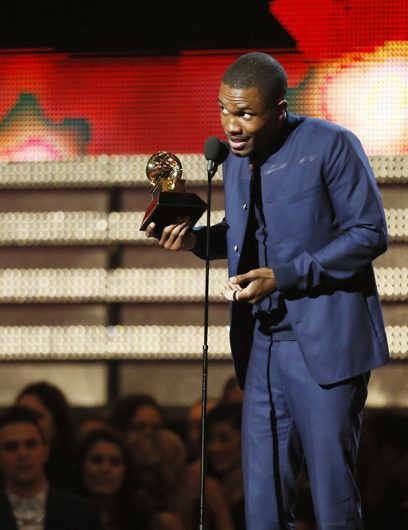
Frank Ocean accepts an award at the 55th Annual Grammy Awards at Staples Center in Los Angeles, California, on Sunday, February 10, 2013. Credit: Courtesy of TNS
The private public figure doesn’t exist in 2016. This is the age of transparency, when almost everything is shared, and what isn’t is dug out by TMZ or anyone with a smartphone. We are so thirsty to be in the loop that there is a cycle of grief for fans in waiting: frustration, desperation, resigned nihilism.
Consider the case of Frank Ocean. In 2012, he released “Channel Orange,” an R&B-soul confessional that put him at superstar level almost overnight.
He did the post-album routine: festivals, the occasional interview and then he was gone. For a while, fans were content to bask in the “Channel Orange” afterglow, but days (then years) piled up. Canceled shows and rumored release days passed without a follow-up. Ocean isn’t on Twitter or Instagram; his online presence is limited to Tumblr where he posts only the occasional message. Fans responded to the delay by bombarding the comment sections of his brother, mother and collaborators with indignance.
A full year after the first release date passed, the rumors started again, and none other than The New York Times said Ocean’s “Channel Orange” follow-up would come on Aug. 5. There was not much surprise when it didn’t. The surprise came when “Blonde” finally dropped, two weeks later.
That’s not a lot of material from which to form the backstory of an album, unlike, say, Kanye West, who is always in the news. The interim between Ocean’s releases was marked by inactivity. Leading up to the release of his album, Ocean didn’t form the backstory, but we, the fans, did. We lacked information, so we created a narrative and built hype to which the album, whenever it came, would have a hard time to live up to.
But, of course, “Blonde” is great. How anyone considered the possibility that it wouldn’t be, I don’t know. There was so much mystery surrounding the whole thing, but all I really wanted to know was what it would sound like. There was no single or full song released in the intervening years, and the lingering question was where Ocean would take his sound next.
It’s unlikely that any track on the record will be played on the radio, there are no immediately accessible pop songs. It’s filled with a surprising amount of guitars, but lack of drums, and incredibly intricate composition in every song.
It’s the sound of an artist putting everything he has into a record, a release that was four years in the making, and every bit better for it. At first, it seems minimalist, but for everything it strips away from “Channel Orange” it adds a degree of experimentation, ending up with a degree of subtle complexity that might not come across on the first listen.
Some of the best moments are the simplest; the contortion of Ocean’s voice on the first half of “Nikes,” the backing keys on “Solo.” Ocean gives his fans what they want: himself, upfront, without a filter.
With lyrics that read like poetry, closer “Futura Free” has the most quotable lines. “They wanna murder me like Selena,” one lyric reads, a comment on the fervor of the listening public as Selena was a singer who was murdered by the president of her fan club. “Jay (Z) hit me on the email/ Said I oughta act my net worth,” reads another, a reminder that Ocean’s gotten so big that American quasi-royalty offer him advice.
The list of collaborators is long, but the only obvious guest voice is Andre 3000, who gets a whole song to himself on “Solo (Reprise).” He delivers a dizzying minute-long verse, and solidifies himself as Ocean’s public inspiration to appear, amaze, then disappear again.
“Blonde” is enough that I feel like I won’t need to crave new Frank Ocean music again after his inevitable upcoming withdrawal from the public. Just don’t call me on it in three years.


